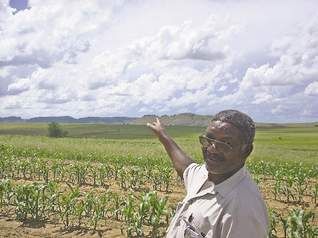Isaac Khuto, 65, got a late start at farming, but he's making the most of it. Khuto, who has an eighth grade education and lived most of his life under the hated apartheid system. But now he's part of a slowly developing effort to help blacks obtain farmland in a way that avoid the wholesale grab of white farms that destroyed food production in Zimbabwe.
Khuto drove a truck and then owned a tax business before getting into agriculture 10 years ago with a few cattle. He now owns 350 hectares, about 875 acres, near the border with Lesotho, a mountainous country that South Africa surrounds. On a portion of the land he grows corn, or maize, using top-of-the-line seed from three different companies – two big-name U.S. biotech companies, Pioneer and Monsanto and a South African supplier. And this year he's conducting his own trial of conventional and biotech seed to see which one gives him a better return. (In the photo above, Khuto is showing me the boundaries of his farm.)
Khuto is one of the success stories among programs being run by South Africa's farm commodity organizations to train new black farmers to become commercial-scale producers. Khuto is being mentored by Johan Kriel, a white former farmer who runs the development program in the Free State province for Grain South Africa, the national organization that represents producers of maize, wheat and other grains. Khuto is one of about 3,000 farmers being trained by the group.
What's in a program like this for a group like Grain SA, dominated by white farmers? Nothing less than political stability and food security, says Kriel, citing the Zimbabwe experience as something farmers here want to avoid.
But success stories like Khuto aside, South Africa has a long way to go. Khuto, because of business interests, was able to obtain a loan to buy his farm. But other blacks are dependent on a government program that will purchase land on their behalf. The trouble is, according to some farmers I met today, the purchasing procedure is so long and cumbersome that buyers get tired of waiting and sell the acreage to someone else with ready cash.
Black farmers also need mentors, white farmers who will both teach them and lend them equipment, and in some cases land. Khuto has been aided considerably by a neighbor, who both provided advice and lent him implements, and even provided the use of some of his land at no cost except the right to graze it.
Kriel would like to see more white farmers take similar starts to get blacks started, but it takes time to change farmers' attitudes, he says.
"Land is s a very, very emotional issue," he said. "If you owned a piece of country for the fifth generation now are you just going to give it away?"
As for Khuto, he says his biggest challenge now is the advanced age at which he got started.
"Without that I would have gone farther."
